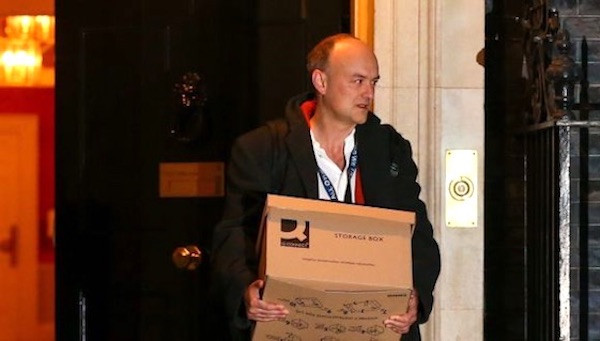
A power struggle at Downing Street that ended on Friday with Boris Johnson’s top advisor Dominic Cummings walking out of Number 10 may mark the beginning of the end for a no-deal Brexit and a hard border through Ireland.
Lee Cain, Johnson’s director of communications and a key ally of Mr Cummings, also stood down. A number of MPs have welcomed the pair’s departure as a chance for the British government to make a fresh start.
Described by former British PM David Cameron as a “career psychopath”, Cummings ran the pro-Brexit ‘Vote Leave campaign’ in the EU referendum. He became a Rasputin-like figure behind Johnson’s far-right ‘War Cabinet’ and pushed for a cataclysmic hard Brexit.
Cummings was also linked to the recent decision to advance the Internal Market Bill, which legislates for Britain to directly renege on the EU Withdrawal Agreement, and indirectly, the Good Friday Agreement in Ireland.
But senior Tories believe the departures could see Mr Johnson reset relations with Ireland and forge a meaningful deal with the EU.
The upheaval at Downing Street follows the reality of a new, anti-Brexit US president as well as the huge logistical problems posed by hard borders.
Striking a deal would avert the risk of raised tensions with Washington over Ireland. US President-elect Joe Biden has already made clear his determination to fulfil the US role as guarantor of the Good Friday Agreement.
A deal would also avert chaos which could affect the delivery of promised Covid-19 vaccines which are to be manufactured in Germany and Belgium.
Recent polls show a substantial majority of voters in Britain now oppose Brexit entirely. Anand Menon, professor of European politics and foreign affairs at King’s College London, said the Vote Leave contingent have been weakened by the shifting political tides.
“They do seem a bit 2016,” he said.
Among the new pressures is the growing influence of Irish-American political figures who have already warned Johnson not to negotiate with Brussels in a way that jeopardises the north of Ireland.
Threatening to remilitarise the border in Ireland was a failed strategy to leverage the EU, said political risk analyst Mujtaba Rahman. “In a world where Trump won, that strategy would probably have been validated, perhaps even reinforced. But of course, with Biden, it’s not going to stand.”
Sinn Féin’s spokesperson on Foreign Affairs and Defence John Brady has called for a collective all-Ireland response to the challenges of Brexit, Covid-19 and constitutional change.
Speaking in the Dáil, Mr Brady said: “We in Ireland have been forced to confront two major challenges - the Covid-19 pandemic and Brexit... their impact questions the validity and common sense of the maintenance of two jurisdictions on our small island.
“Arguably, our response to Covid-19 has been impeded by a dual, and often conflicting, response between the north and south of Ireland.
“If there is one clear message that arises from the experience of Brexit and Covid, it is that we must begin the process of planning for constitutional change on this island.
“We must ensure that the process of planning is all-inclusive, that it provides for input for all shades of opinion and outlook on the island and that it is an all-island approach.
“Nothing could be clearer - the future of the shared experience of the peoples of this island lies in the reunification of Ireland.”
![[Irish Republican News]](https://republican-news.org/graphics/title_gifs/rn.gif)
![[Irish Republican News]](https://republican-news.org/graphics/title_gifs/harp.gif)

